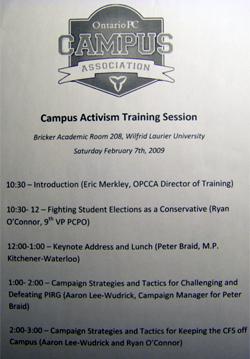The Ontario Progressive Conservative Campus Association (OPCCA) has been running workshops on university campuses in Ontario instructing members on how to infiltrate student unions and campus public interest research groups, according to documents released on Wikileaks.org on Mar 13. The leaked information includes audio recordings purportedly from a workshop held in Toronto in late January.
“If it’s possible if in one fell swoop to take over the board of directors [of OPIRG], I think that it would be pretty impressive and you’d be a hero to the Conservative movement if you can pull that off,” says one voice in the recordings, identified in the web posting as Aaron Lee-Wudrick, former campaign manager for Conservative MP Peter Braid. Braid was the keynote speaker at the Feb 7 version of the workshop held in Waterloo. OPIRG, the Ontario Public Interest Research Group, is a social justice organization whose stated goals include opposing heterosexism.
“So how do you address PIRG? PIRG is doing something on your campus, it’s a cause that maybe you and your friends in the Tory club dislike,” says a voice in the recordings identified in the web posting as Ryan O’Connor, former vice president of the Waterloo Federation of Students.
Shelley Melanson, chairperson for the Canadian Federation of Students – Ontario, says she’s disturbed that a federal or provincial party would attempt to influence campus politics.
“It is inappropriate for political parties of any stripe to interfere with the democratic processes of student unions, particularly in the case of elections to try to provide influence, funding, strategies or support to candidates’ elections,” says Melanson.
But OPCCA president Eric Merkley says the organization is student-run and receives neither funding nor input from either the federal or provincial Conservatives.
“There’s no affiliation with the Conservative Party of Canada,” says Merkley, adding that the workshops were designed to encourage conservative students to get more involved in student politics and campus life.
Traditionally southern Ontario’s student unions have been supportive of gay campus initiatives and many campus public interest research groups run queer activist campaigns, often in collaboration with campus queer groups.
“A lot of queer and trans organizing in campus in this area comes from student unions and Pride centres and if we were to get people in the student union that weren’t supportive of those initiatives it is foreseeable that they won’t get financial support or support in general,” says Rebecca Rose, vice president education of the Ryerson Student Union (RSU).
Rose points to the demonstration organized by RSU in June 2006 when Margaret Sommerville, an outspoken academic against same-sex marriage, came to university’s downtown campus. She says the union has also participated in the International Day Against Homophobia, advocated for gender-neutral washrooms on campus and campaigned against the Canadian Blood Services policies restricting queer men from donating blood or organs.
“We have never seen our Pride centre cut [after a student union regime change] from what I can remember but we have seen campaigns cut and obviously those campaigns would include queer and trans issues,” says Rose.
In 2004 when a conservative slate took over the York Federation of Students — York University’s student union — budget cuts were made to service organizations including the Trans Bisexual Lesbian Gays Allies at York, the York University Black Student Alliance and the Aboriginal Students Association. A year later a more progressive slate was voted in, reversing budget cuts and reinstating all three organizations as essential services.
Merkley says OPCCA isn’t necessarily interested in cutting funding to campus queer organizations but in seeing that fees collected from students via levies are distributed more evenly.
“It’s not about cutting funding to groups like that,” he says. “We’re not about taking over but ensuring the fee structure is fair and democratic.
“OPIRG draws student fees from students, which draws to their ideological aims and other views on campus do not get support. We believe in free speech and each group should have their own political aims.”
The OPCCA workshops were held in light of student union elections that dominate Canadian campuses during the month of March. Melanson says it’s important that student politicians be elected on their own merit or work, rather than their political affiliations.
“Cuts that are made by any executives are the will of the student body and student membership and not ruled by any particular ideology or a particular party,” she says.

 Why you can trust Xtra
Why you can trust Xtra


